

Practice Activities: Pronouns. Identifying Pronouns As you read the following passage, identify all of the pronouns, as well as what type of pronoun each is.
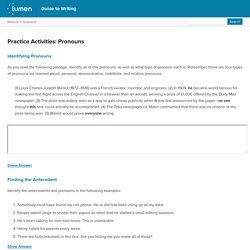
Remember, there are four types of pronouns we learned about: personal, demonstrative, indefinite, and relative pronouns. (1) Louis Charles Joseph Blériot (1872–1936) was a French aviator, inventor, and engineer. (2) In 1909, he became world famous for making the first flight across the English Channel in a heavier than air aircraft, winning a prize of £1,000 offered by the Daily Mail newspaper. (3) The prize was widely seen as a way to gain cheap publicity when it was first announced by the paper—no one thought this feat could actually be accomplished. (4) The Paris newspaper Le Matin commented that there was no chance of the prize being won. (5) Blériot would prove everyone wrong.
Show Answer. Antecedent Agreement. As you write, make sure that you are using the correct pronouns. When a pronoun matches the person and number of its antecedent, we say that it agrees with it antecedent. Let’s look at a couple of examples: I hate it when Zacharias tells me what to do. He‘s so full of himself.The Finnegans are shouting again. I swear you could hear them from across town! In the first sentence, Zacharias is singular, third person, and masculine. Pronoun - Antecedent Agreement - Exercise03.
Khanacademy. Pronoun - Antecedent Agreement - Exercise02. Pronoun - Antecedent Agreement - Exercise01. Pronoun-Antecedent Agreement. A pronoun is a word used to stand for (or take the place of) a noun.
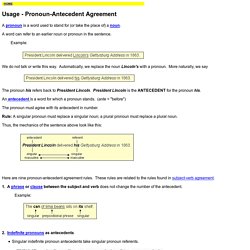
A word can refer to an earlier noun or pronoun in the sentence. Example: We do not talk or write this way. Pronouns and Pronoun-Antecedent Agreement. Basic Principle: A pronoun usually refers to something earlier in the text (its antecedent) and must agree in number — singular/plural — with the thing to which it refers.
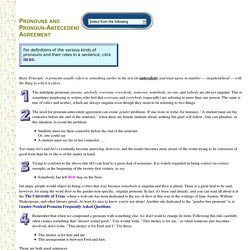
The indefinite pronouns anyone, anybody, everyone, everybody, someone, somebody, no one, and nobody are always singular. This is sometimes perplexing to writers who feel that everyone and everybody (especially) are referring to more than one person. The same is true of either and neither, which are always singular even though they seem to be referring to two things. The need for pronoun-antecedent agreement can create gender problems. If one were to write, for instance, "A student must see his counselor before the end of the semester," when there are female students about, nothing but grief will follow.
Students must see their counselor before the end of the semester. Trying to conform to the above rule (#2) can lead to a great deal of nonsense. Somebody has left their bag on the floor. This money is for him and me. Pronoun-Antecedent Errors. You can see from the above examples that pronouns like her, she, and it are essential to avoid repetition.
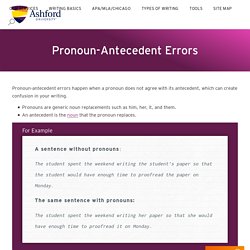
Notice that it is clear what the antecedent is for each of the pronouns: her (the student), she (the student), it (the paper). It is important to match pronouns to their antecedents in gender and in number. If, for example, your pronoun is “it,” it should not be referring back to the antecedent “Molly.” “Molly” is a person, so the better pronoun is “she.” Here are some examples of pronouns that would fit with some antecedents: It = Chair He= Jim She = Kellie They = Stanley and Susie Me = Michelle It should be clear who or what the pronoun is standing in for. Sarah and Shawna went to the store, but she could not find what she was looking for. Demonstrating How to Use Demonstratives.
From VOA Learning English, this is Everyday Grammar.
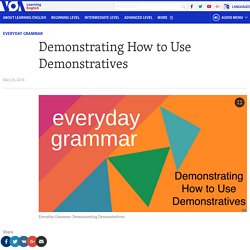
Have you ever wondered about the differences between the words this, that, these and those? These words are called demonstratives. Demonstratives tell who or what you are talking about. They are often a source of confusion for English learners, because other languages use demonstratives in different ways than English does. Demonstratives can act as pronouns or as determiners. A determiner is a word that comes before a noun and is used to show which thing is being referred to. Faulty Pronoun Reference. © 2000, 1999, 1987 Margaret L.
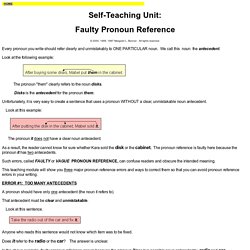
Benner All rights reserved. Every pronoun you write should refer clearly and unmistakably to ONE PARTICULAR noun. We call this noun the antecedent. Look at the following example: Pronouns and Antecedents. Antecedent Agreement. College Writing Handbook. Antecedents + Pronouns. Accessibility links Languages VOA Learning English PreviousNext Breaking News Live Everyday Grammar TV Everyday Grammar: Antecedents + Pronouns May 06, 2018 Embed The code has been copied to your clipboard.
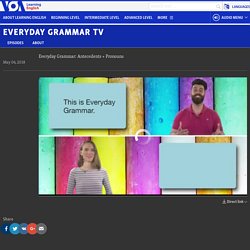
The URL has been copied to your clipboard. Pronouns and Antecedents. Pronouns and Their Antecedents Today we’re going to talk about pronouns that don't clearly match up with the nouns they are supposed to replace.
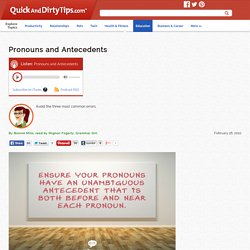
Readers become unhappy when they have to guess what noun a writer is talking about, or readers may even chuckle if a pronoun seems to match up with the wrong noun. Later, you’ll see some sentences that are funny all because of little pronouns. Quick Pronoun Review If you're a regular reader, you'll remember that last week we talked about subject and object pronouns. The pronouns “me,” “him,” “her,” “you,” “us,” “them,” and “it” must be in the object position, as in “The batter hit the ball to me.”